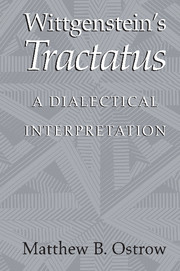II - What is analysis?
Published online by Cambridge University Press: 03 February 2010
Summary
Wittgenstein's declaration of the inexpressibility of the pictorial form at 2.172 and 2.174 is followed by the introduction of a new notion – the logical form: “What every picture, of whatever form, must have in common with reality in order to be able to depict (abbilden) it at all – rightly or falsely – is the logical form (die logische Form), that is, the form of reality” (TLP 2. 18). With this mention of “reality,” we are of course called back to the discussion at the beginning of the picture theory. The notion of reality, we have seen, is connected with the existence and nonexistence of atomic facts, which is to say with everything that the picture can be used to depict. It is not at once clear, however, just how such an idea would differentiate the logical form from the pictorial, if Wittgenstein does in fact intend to distinguish the two. After all, the claim that the picture must share with the reality it depicts a pictorial form is central to the picture theory. What is the purpose of holding that there is also common to the picture and reality another kind of form?
The basis of Wittgenstein's answer is suggested by the next two remarks: “If the pictorial form is the logical form, then the picture is called a logical picture” (TLP 2.181). “Every picture is also a logical picture. (On the other hand, for example, not every picture is spatial.)” (TLP 2.182). On this account, the logical form appears in some sense to contain the pictorial form: every spatial picture is to be construed as a logical picture, but not every logical picture is spatial (or temporal or colored).
- Type
- Chapter
- Information
- Wittgenstein's TractatusA Dialectical Interpretation, pp. 46 - 78Publisher: Cambridge University PressPrint publication year: 2001



